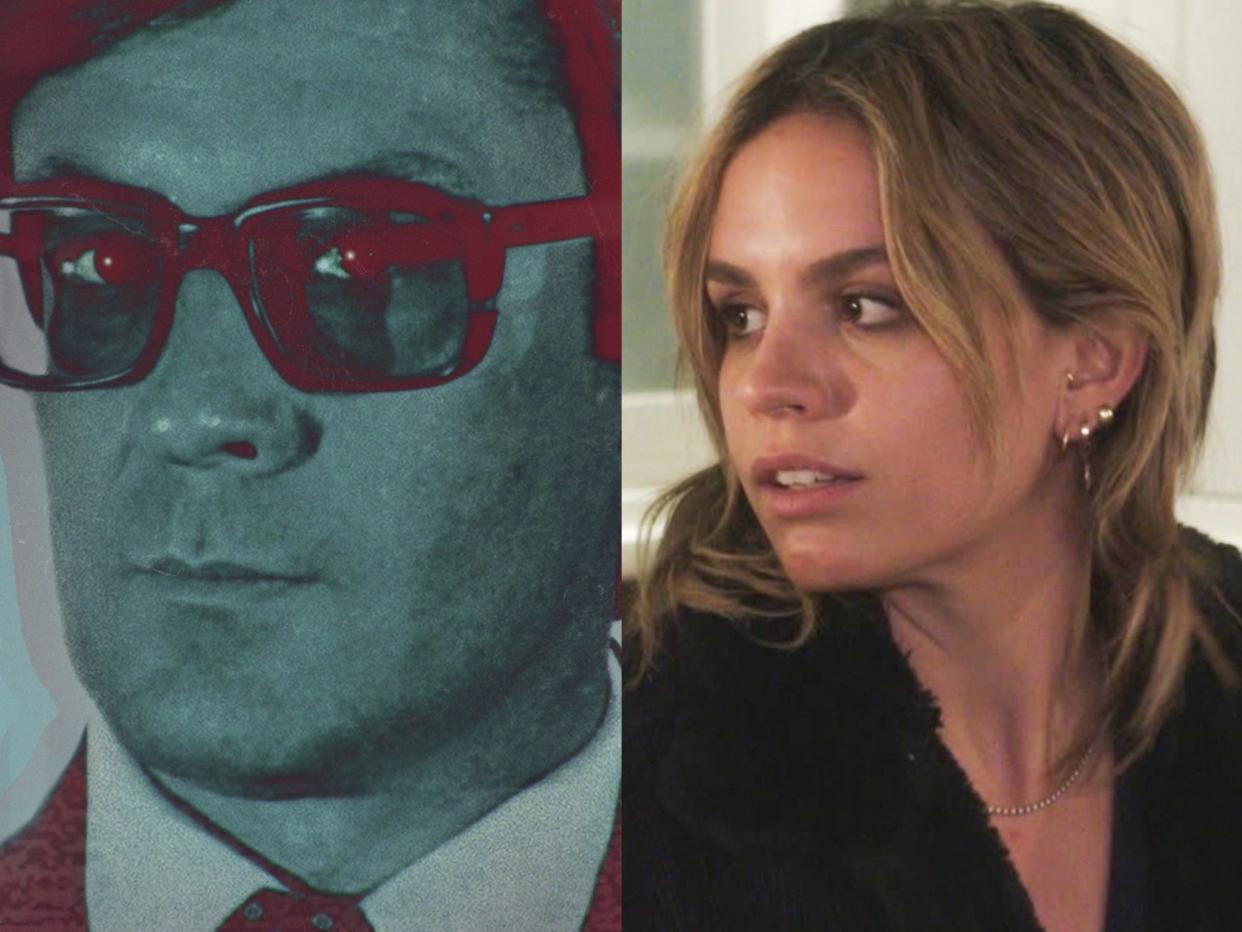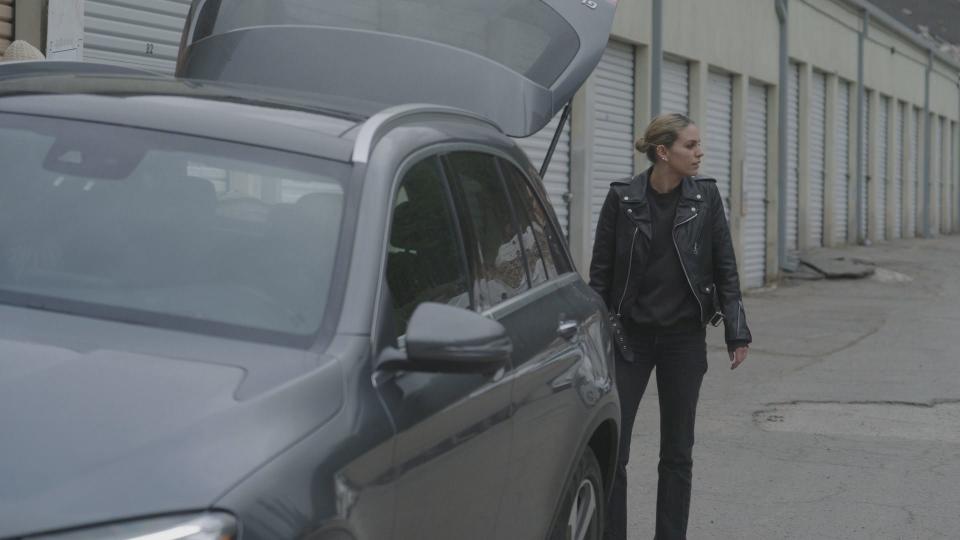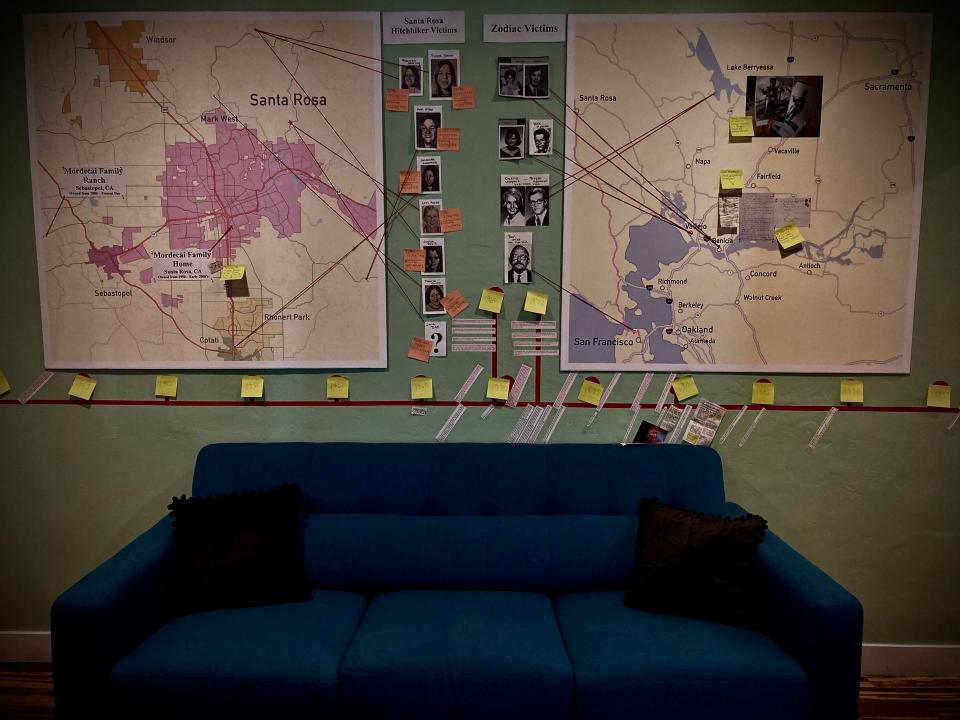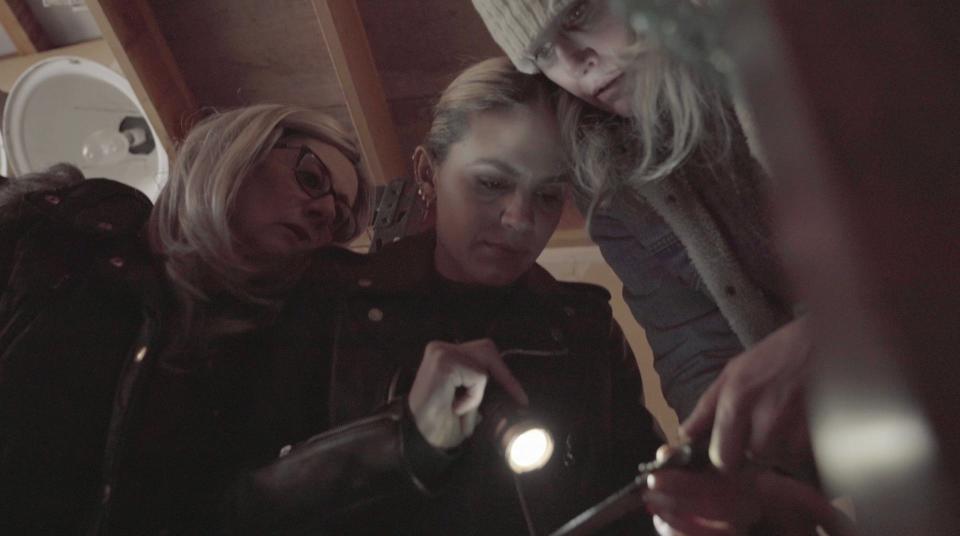She'd heard her step-grandfather was a monster. But was he also the Zodiac Killer?

Max's "The Truth About Jim," directed by Skye Borgman, follows Sierra Barter's investigation into her step-grandfather.
Jim Mordecai, who died in 2008, was accused of harassment and sexual assault by multiple women.
Barter also investigates whether Mordecai may have been the infamous Zodiac Killer.
Sierra Barter always knew her grandmother's husband was a bad man. But was Jim Mordecai an infamous serial killer too?
That's the question at the crux of Max's "The Truth About Jim," a new docuseries from Skye Borgman, the critically acclaimed filmmaker behind true crime hits like "The Girl in the Picture" and "Abducted in Plain Sight."
The four-part saga, which premiered February 15, tracks Barter's investigation into Mordecai, a former high school teacher in the San Francisco Bay area city of Half Moon Bay. She speaks to Mordecai's family members and other alleged victims, building a disturbing picture of a man who many say bullied and terrorized them with violence, threats, and even rape until his death from cancer in 2008.
Throughout the series, Mordecai's family members and other women come forward to say they were viciously bullied and sexually or physically abused by the former Northern California teacher, who they also accuse of preying on teenage girls. One of his daughters recounts nightmares of being raped by him, and his former stepdaughter, Christi Probst, says she was sexually abused by him for years, starting when she was 13.
For Barter, who was young when Mordecai died, the investigation was deeply personal on many levels. At the time she started digging into Mordecai, she says she was healing from being sexually assaulted for the second time in her life. She had gone back to school to study film during the pandemic and started writing about her family. A producer who came to her class asked whether Barter's story was true and put her in touch with Imagine Entertainment, a production company that in turn connected her with Borgman.
Borgman, of course, is no stranger to deeply disturbing family sagas, and she gets plenty of pitches for new material. What immediately captivated the filmmaker when she heard Barter's story was how survivor-forward it was.
"There were three generations of women affected here," Borgman told Business Insider, referring to Barter, Mordecai's daughters and stepdaughters (including Barter's mother, Shannon Barter), and Mordecai's wives (including Barter's grandmother, Judy Mordecai).
"Looking at what generational trauma can do to people is incredibly interesting to me," she said. "Looking at the effects of one man on a family was very, very compelling."
There were even more stories about Mordecai that didn't make it into the docuseries
Despite the flood of horrific stories about Mordecai from those closest to him, not everyone in Half Moon Bay was supportive of Barter's digging.
In one jarring scene in the documentary, Shannon Barter, who was a student of Mordecai's in high school before he married her mother, recalls posting about her negative experiences with Mordecai in a Facebook group and asking if others had stories to share. The majority of responses, according to Shannon, were from former students defending Mordecai and berating her for making the accusations against a man who was dead and couldn't defend himself.
"He was incredibly gifted at painting this picture of himself as this very athletic, mentor-type person," Barter told BI. "For all the terrible things that he did do, there were things that he did that were really great for people — he helped people get into college."
"It was really a matter of demasking Jim," she added. "Just tearing down that facade he had built for so many years."

Despite the pushback, every family member who appears in the docuseries is unanimous in their contention that Mordecai was a monster. In addition to speaking with her own mother and grandmother, Barter interviews Jeanne Kirkpatrick, Mordecai's second wife; Christi and Michael Probst, Mordecai's former stepchildren through Kirkpatrick's previous marriage; and Melissa and Jaime Mordecai, his two daughters with Kirkpatrick.
Mordecai's first wife, Shannon Yeager, and their two children don't appear in the docuseries, however. But it's not because they disagreed with how he was portrayed.
Yeager, Barter says, was unavailable to shoot when they were filming due to personal matters. "But we've had conversations with her. She's aware. She agrees he was not a great guy, and she has a ton of stories of her own as well," she explained.
Yeager and Mordecai's daughter died years ago. Their son was also unavailable for filming but had plenty of negative stories about his father as well, according to Barter. "He was not on team Jim," she said.
Was Jim Mordecai the Zodiac Killer?

After fleshing out a portrait of the ways Mordecai harmed his own family, Barter set out to investigate the long-simmering suspicions she and her mother shared that Mordecai's crimes had escalated to murder. In the docuseries, we see her track down leads and speak to witnesses involved in the Santa Rosa Hitchhiker Murders, a slew of killings in the 1970s that local authorities theorized were all committed by one serial killer.
In one shocking scene, Barter comes face to face with a woman named Mary, whose two friends were believed to be victims of the Santa Rosa killer decades earlier. Mary recounts seeing a man watching her friends at the ice rink shortly before they were abducted. When Barter shows her a photo of Mordecai, Mary reacts strongly and says he does look like the man she saw all those years ago.
Barter is visibly shaken by the reveal, and the moment is electric.
"It was one of the hardest moments for sure on the show. Just a moment that was captured so raw," she tells BI. "I just felt really derailed in that moment, I was almost like, 'Okay, what's going on? Who's joking with me right now?'"
"It was an experience I had no tools for, no language for," she continued. "I've never been around anything like that."
Borgman, for her part, said witnessing Barter's conversation with Mary, effectively the first true piece of evidence that Mordecai may indeed have been a killer, was a "bizarre, surreal experience."
"It was a little bit shocking. Sierra may have even said to us, 'Did you set this up? Did you tell her?'" Borgman said. "I think there was that moment of disbelief that there is this potential connection that may be there. Like, 'Holy cow, this is something real.'"
At one point, Barter even considers the possibility that Mordecai may have been the Zodiac Killer — one of the most infamous unidentified murderers of all time. Borgman and Barter decided to follow that thread, unraveling it in real time during filming.
"It was something that Sierra and the rest of her family thought could be a possibility," Borgman told BI. "We set out early on to say, 'Let's look at all the possibilities. Let's not just put something away because we don't think it could be this. Let's dive into it, let's do the investigation, let's ask the questions.'"
"Sierra never was like, 'I'm certain it's this.' She was just like, 'I want to find the truth," she continued.
In the end, the Zodiac theory doesn't pan out — Barter meets with Zodiac expert Mike Butterfield, who concludes that there isn't compelling evidence to link Mordecai to the crimes. But in the final episode of the docuseries, Barter finally compiles all of her evidence linking Mordecai to the Santa Rosa killings and turns it over to the Sonoma County Sheriff's Office.
The closing tag says that the investigation is ongoing, and Borgman and Barter confirm that there are still no updates on whether or not Mordecai was the murderer.
Ultimately, though, proving whether Mordecai was a killer isn't the main point of the docuseries. It's about healing — Barter's own journey to healing after her sexual assaults, and how she facilitates her fractured family's healing after decades of trauma at Mordecai's hands.
Most movingly, we see Barter's mother and grandmother make inroads after years of estrangement due to Judy's decision to remain married to Mordecai, who Shannon says harassed her both before and during the marriage.

Mordecai's third wife, Judy, was married to him for 20 years until his death in 2008 and had long been resistant to believing the stories about her husband's violent and disturbing behavior — even when the warnings came from her own daughter. But Judy, like the rest of Barter's family, was "never hesitant" to participate in the docuseries and dive deep into the trauma of the past.
"She was like, 'Okay, if this is what we're doing as a family, I guess it's what we're doing, and I'm going to answer all the questions,'" Barter said of her grandmother. "I think part of it is that she needed to do it in order to forgive herself. I think she felt like she owed that to us."
"What she went through was so hard, and she does have a lot of guilt for what she did to my mom," she continued. "So for her to face that in such a public way… I say it all the time: I stand on the shoulders of giants. These women are just incredible. And I am so, so thankful that these are the women that I get to call my family."
Beyond her own family's experience, Barter has a simple takeaway for viewers of her story: listen to survivors.
"It's never easy to say these kinds of things. I don't think anybody in their right mind wants to admit that they've been victimized in any way," Barter said.
"I hope two things: I hope people listen to people, and I hope that if there are survivors out there who are feeling desperate and lonely or sad and scared, I hope that they see this and they know that they're not alone — that there are people out there going through the same thing. And there is nothing wrong and defective about them."
"The Truth About Jim" is now streaming on Max.
Read the original article on Business Insider


